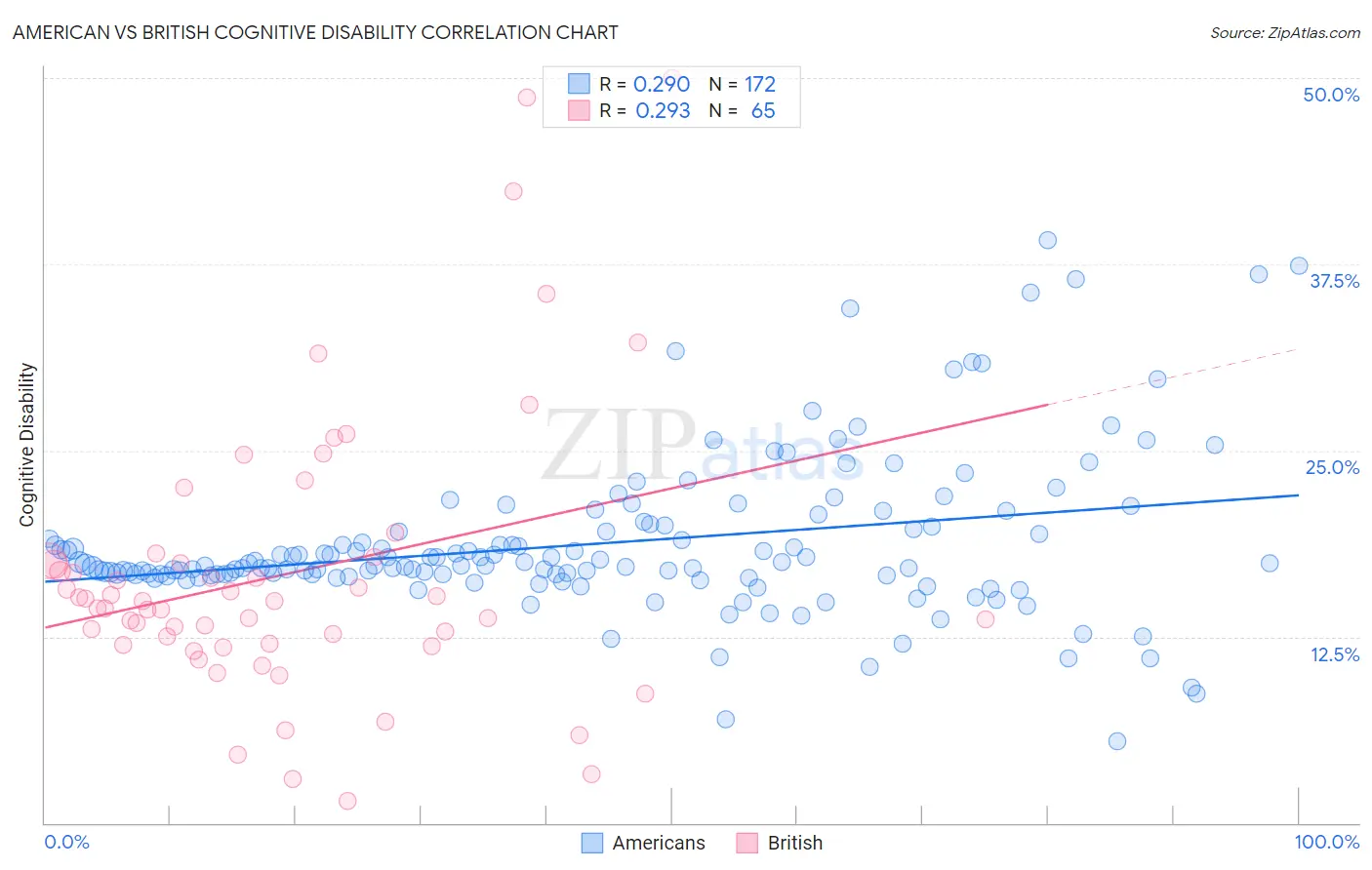American vs British Cognitive Disability
COMPARE
American
British
Cognitive Disability
Cognitive Disability Comparison
Americans
British
17.2%
COGNITIVE DISABILITY
72.2/ 100
METRIC RATING
161st/ 347
METRIC RANK
17.0%
COGNITIVE DISABILITY
89.3/ 100
METRIC RATING
143rd/ 347
METRIC RANK
American vs British Cognitive Disability Correlation Chart
The statistical analysis conducted on geographies consisting of 581,739,029 people shows a weak positive correlation between the proportion of Americans and percentage of population with cognitive disability in the United States with a correlation coefficient (R) of 0.290 and weighted average of 17.2%. Similarly, the statistical analysis conducted on geographies consisting of 531,402,976 people shows a weak positive correlation between the proportion of British and percentage of population with cognitive disability in the United States with a correlation coefficient (R) of 0.293 and weighted average of 17.0%, a difference of 0.84%.

Cognitive Disability Correlation Summary
| Measurement | American | British |
| Minimum | 5.5% | 1.5% |
| Maximum | 39.1% | 50.0% |
| Range | 33.6% | 48.5% |
| Mean | 18.8% | 16.7% |
| Median | 17.3% | 14.9% |
| Interquartile 25% (IQ1) | 16.6% | 12.0% |
| Interquartile 75% (IQ3) | 19.8% | 17.7% |
| Interquartile Range (IQR) | 3.2% | 5.7% |
| Standard Deviation (Sample) | 5.3% | 9.5% |
| Standard Deviation (Population) | 5.3% | 9.4% |
Demographics Similar to Americans and British by Cognitive Disability
In terms of cognitive disability, the demographic groups most similar to Americans are Australian (17.2%, a difference of 0.010%), Yugoslavian (17.2%, a difference of 0.020%), Immigrants from Latvia (17.2%, a difference of 0.040%), Celtic (17.1%, a difference of 0.070%), and Immigrants from Australia (17.1%, a difference of 0.14%). Similarly, the demographic groups most similar to British are Immigrants from Brazil (17.0%, a difference of 0.0%), Carpatho Rusyn (17.0%, a difference of 0.020%), Immigrants from South Eastern Asia (17.0%, a difference of 0.050%), Costa Rican (17.0%, a difference of 0.10%), and Scotch-Irish (17.1%, a difference of 0.23%).
| Demographics | Rating | Rank | Cognitive Disability |
| Carpatho Rusyns | 89.6 /100 | #142 | Excellent 17.0% |
| British | 89.3 /100 | #143 | Excellent 17.0% |
| Immigrants | Brazil | 89.3 /100 | #144 | Excellent 17.0% |
| Immigrants | South Eastern Asia | 88.7 /100 | #145 | Excellent 17.0% |
| Costa Ricans | 88.0 /100 | #146 | Excellent 17.0% |
| Scotch-Irish | 85.9 /100 | #147 | Excellent 17.1% |
| French Canadians | 85.7 /100 | #148 | Excellent 17.1% |
| Cypriots | 85.7 /100 | #149 | Excellent 17.1% |
| Basques | 85.5 /100 | #150 | Excellent 17.1% |
| Syrians | 83.0 /100 | #151 | Excellent 17.1% |
| Immigrants | Indonesia | 82.7 /100 | #152 | Excellent 17.1% |
| Immigrants | Kazakhstan | 80.5 /100 | #153 | Excellent 17.1% |
| Immigrants | Malaysia | 79.3 /100 | #154 | Good 17.1% |
| Brazilians | 78.9 /100 | #155 | Good 17.1% |
| Sri Lankans | 78.9 /100 | #156 | Good 17.1% |
| Immigrants | Australia | 76.0 /100 | #157 | Good 17.1% |
| Celtics | 74.1 /100 | #158 | Good 17.1% |
| Immigrants | Latvia | 73.2 /100 | #159 | Good 17.2% |
| Australians | 72.4 /100 | #160 | Good 17.2% |
| Americans | 72.2 /100 | #161 | Good 17.2% |
| Yugoslavians | 71.6 /100 | #162 | Good 17.2% |